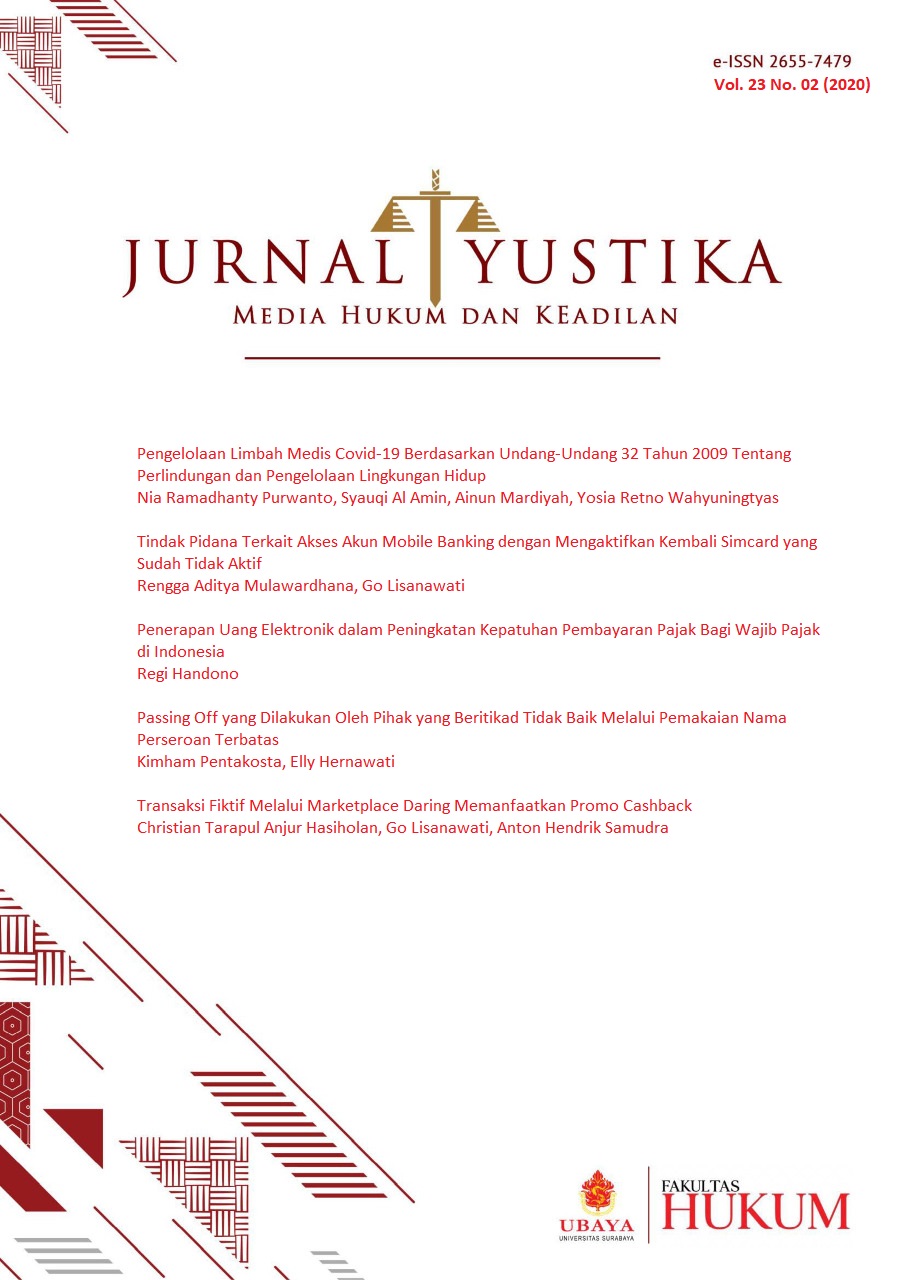Penerapan Uang Elektronik dalam Peningkatan Kepatuhan Pembayaran Pajak Bagi Wajib Pajak di Indonesia
 Abstract Views:
435 times
Abstract Views:
435 times
 PDF Downloads:
421 times
PDF Downloads:
421 times
Abstract
Tax payment compliance has always been a polemic in any country in the world, including in Indonesia. Indonesia applies a taxation system in the form of self-assessment in which taxpayers have full authority in carrying out their tax obligations. On the one hand, this principle is very good for the tax authorities or the Directorate General of Taxes (DGT), because it reduces their administrative costs. With taxpayers calculating, paying, and reporting their own tax obligations, DGT is on the passive side because it is only a matter of waiting for tax deposits and reports. On the other hand this also creates new problems. DGT very much depends on the honesty, willingness and level of understanding of taxpayers of their respective tax rules and obligations. The main problem with this principle is the honesty stage. Humans basically will always try with the least possible sacrifice and will try to get the maximum result or benefit. Meanwhile, tax, however its form, is still an expense that must be borne by the taxpayer. This is what causes taxpayers, to always arise reluctance to pay taxes which in the next stage is trying to find ways to reduce tax payments as small as possible. Meanwhile, the state always expects the income from the tax payments of its citizens to ensure the survival and the implementation of development as a whole. For this reason, a breakthrough is needed so that these differences in interests can reach a good common ground for all parties.
Downloads
References
Buku:
Abdul Wahid. (2011). Kejahatan Mayantara (Cyber Crime). Jakarta: Refika Aditama.
Adami Chazawi. (2005). Tindak Pidana Mengenai Kesopanan. Bandung: Rajagrafindo Persada.
Brondolo. (2009). Strategi Perluasan Basis Pajak di Tengah Perluasan Ekonomi. Jakarta: DDTC.
Darussalam, Danny Septriadi, B.Bawono Kristiaji, & Denny Vissaro. (2019). Era Baru Hubungan Otoritas Pajak dengan Wajib Pajak. Jakarta: DDTC.
Deris Setiawan. (2005). Sistem Keamanan Komputer. Jakarta: PT Elex Media Komputindo.
Girasa. (2002). Cybercrime Pemahaman dan Upaya Pencegahan Kejahatan Berteknologi. Yogyakarta: Citra Aditya Bakti.
Hamzah, Andi. (1989). Aspek-Aspek Pidana di Bidang Komputer. Jakarta: Sinar Grafika.
Iwan Budisantoso. (2011). Sukses Mengolah Sampah Organik menjadi Pupuk Organik. Semarang: Pustaka Baru Press.
Maskun. (2012). Kejahatan Siber (Cyber Crime) Suatu Pengantar. Bandung: Prenada.
Sujarwo, Tristanti, Widyaningsih, & Dwi Hadya Jayani. (2014). Pengelolaan Sampah Organik dan Anorganik. Yogyakarta: Universitas Negeri Yogyakarta.
Peraturan Perundang-Undangan:
Undang – Undang Nomor 36 tahun 2008 tentang Pajak Penghasilan
Undang – Undang Nomor 42 tahun 2009 tentang Pajak Pertambahan Nilai Barang dan Jasa dan Pajak Penjualan atas Barang Mewah
Undang – Undang Nomor 28 tahun 2007 tentang Ketentuan Umum dan Tata Cara Perpajakan
Undang – Undang Nomor 10 tahun 1998 tentang Perbankan
Peraturan Otoritas Jasa Keuangan Nomor 1/POJK.07/2013 mengenai Perlindungan Konsumen Sektor Jasa Keuangan
Surat Edaran Nomor 14/SEOJK.07/2014 mengenai Kerahasiaan dan Keamanan Data dan/ atau Informasi Pribadi Konsumen
Surat Edaran Bank Indonesia No.11/11/DASP tanggal 13 April 2009 perihal Uang Elektronik (Electronic Money)
Peraturan Bank Indonesia Nomor 11/12/PBI/2009 tanggal 13 April 2009 tentang Uang Elektronik (Electronic Money)

This work is licensed under a Creative Commons Attribution-ShareAlike 4.0 International License.
All articles published in YUSTIKA are licensed under a Creative Commons Attribution-ShareAlike 4.0 International (CC BY-SA) license. This means anyone is free to copy, transform, or redistribute articles for any lawful purpose in any medium, provided they give appropriate attribution to the original author(s) and YUSTIKA, link to the license, indicate if changes were made, and redistribute any derivative work under the same license.
Copyright on articles is retained by the respective author(s), without restrictions. A non-exclusive license is granted to YUSTIKA to publish the article and identify itself as its original publisher, along with the commercial right to include the article in a hardcopy issue for sale to libraries and individuals.
Although the conditions of the CC BY-SA license don't apply to authors (as the copyright holder of your article, you have no restrictions on your rights), by submitting to YUSTIKA, authors recognize the rights of readers, and must grant any third party the right to use their article to the extent provided by the license.

 DOI:
DOI:




.jpg)




